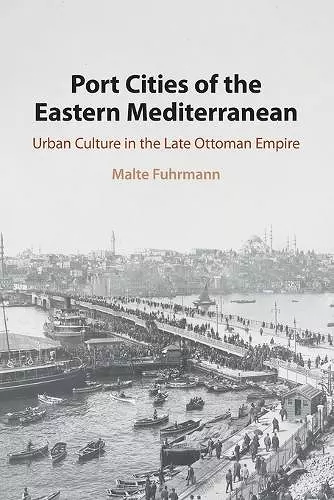Port Cities of the Eastern Mediterranean
Urban Culture in the Late Ottoman Empire
Format:Paperback
Publisher:Cambridge University Press
Published:30th Jun '22
Currently unavailable, and unfortunately no date known when it will be back
This paperback is available in another edition too:
- Hardback£83.00(9781108477376)

A fascinating history of nineteenth century Eastern Mediterranean port cities, re-examining European influence over the changing lives of their urban populations.
A fascinating history of nineteenth century Eastern Mediterranean port cities, which re-examines the European influence over the urban space, leisure practises, and the formation of class, gender and national identity, providing an alternative view of the relationship between the Islamic World and Europe.Eastern Mediterranean port cities, such as Constantinople, Smyrna, and Salonica, have long been sites of fascination. Known for their vibrant and diverse populations, the dynamism of their economic and cultural exchanges, and their form of relatively peaceful co-existence in a turbulent age, many would label them as models of cosmopolitanism. In this study, Malte Fuhrmann examines changes in the histories of space, consumption, and identities in the nineteenth and early twentieth century while the Mediterranean became a zone of influence for European powers. Giving voice to the port cities' forgotten inhabitants, Fuhrmann explores how their urban populations adapted to European practices, how entertainment became a marker of a Europeanized way of life, and consuming beer celebrated innovation, cosmopolitanism and mixed gender sociability. At the same time, these adaptations to a European way of life were modified according to local needs, as was the case for the new quays, streets, and buildings. Revisiting leisure practises as well as the formation of class, gender, and national identities, Fuhrmann offers an alternative view on the relationship between the Islamic World and Europe.
'Malte Fuhrmann's richly nuanced and elegantly theorized study explores the late-Ottoman port-cities' sites of cultural exchange and adaptation, ranging from balls and opera to beer halls, cafés and brothels. The complex and fluid interactions revealed force us to rethink the dominant narrative of Westernization and identity-formation in the Eastern Mediterranean.' Benjamin C. Fortna, University of Arizona
'An essential read for historians of the Eastern Mediterranean. Α wealth of material captures vividly contemporary voices and shows how people in the most emblematic ports of the Ottoman Empire tried, consumed, became part of and in some ways rejected 'Europe' while constructing Eastern Mediterranean modernity.' Sakis Gekas, York University, Toronto
'Port Cities of the Eastern Mediterranean is a richly detailed comparative history of cultural exchange and urban modernity in the eastern Mediterranean. … the book-cinemas, opera houses, gymnastics clubs, boulevards, beer gardens, cafés, and brothels together support a remarkable study that poses a stunning (if gently argued) challenge to existing work in Ottoman, urban, and cultural history. A rewarding read.' R. A. Miller, Choice
'… a delight to read … Fuhrmann's is an achievement for revisiting a subject that is often considered exhausted in known frameworks, and indeed for reopening discussions of urbanity at new levels. This is welcome not only to those in the field but to readers outside the field who are interested in the many and ongoing facets of what it means to be urban.' Meltem Toksoz, American Historical Review
'… I would compare Fuhrmann's achievement to a challenging, but very successful balancing act. He uses textual sources of a dominantly anecdotal and often subjective nature, but with a rigor that wards off most of the dangers inherent to this kind of material. He navigates back and forth in a period of about a century with some liberty, but manages to maintain the required level of consistency while doing so. He focuses on a number of individual cases and moments in the life and culture of these port cities, yet he also manages to provide them with a theoretical and historiographical framework, which is extremely useful for the readers, especially if they are not familiar with this complex and multilayered context.' Edhem Eldem, H-Soz-Kult
'Fuhrmann's ambitious undertaking looks at modern Ottoman culture in relation to 'the West' in Salonica, Smyrna, and Constantinople. An unusual array of archival material, supplemented by the author's vast knowledge of literature, is called upon to depict the urban space as a site of ambivalence and as a stage for the multitude of identities intimately intertwined with the European landscape. … Through examples and extensive analysis, Fuhrmann's study attempts to achieve what great art does (to paraphrase Orhan Pamuk) - to change the landscape of our minds.' Esra Almas, Studies in Contemporary Jewry
ISBN: 9781108708623
Dimensions: 229mm x 152mm x 25mm
Weight: 651g
490 pages